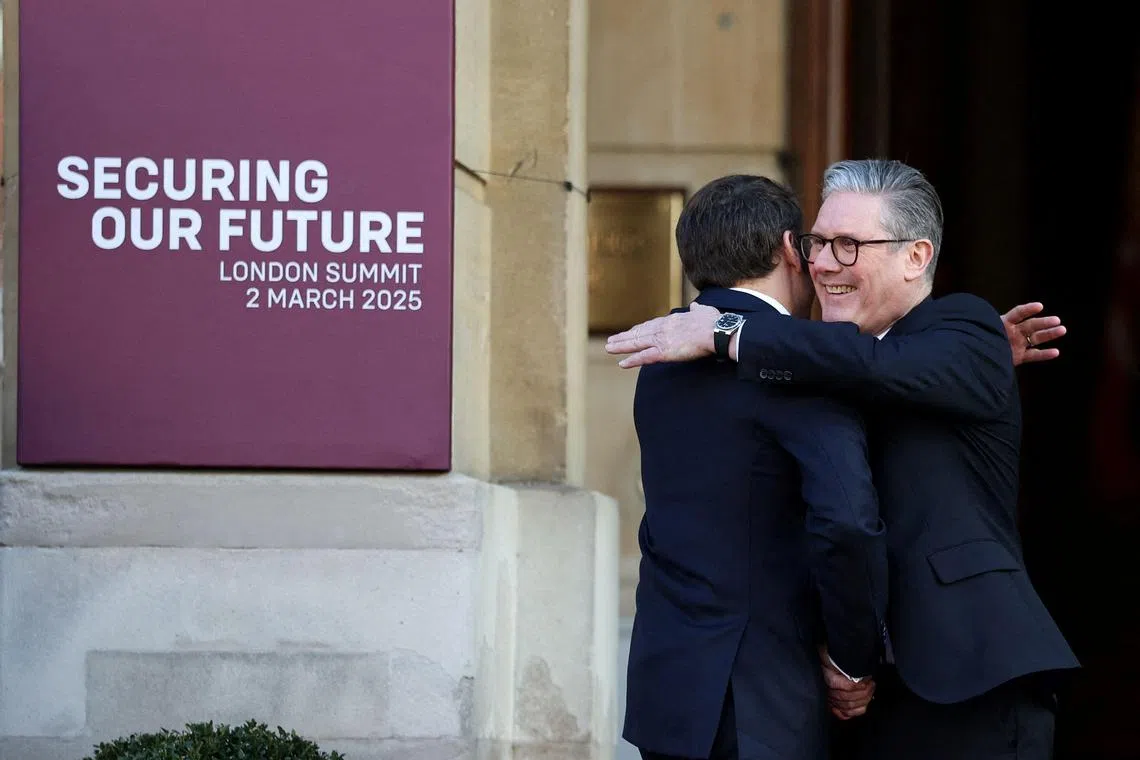Starmer puts UK back on world stage as ‘bridge’ over Ukraine
Sign up now: Get ST's newsletters delivered to your inbox

Mr Starmer has spearheaded efforts to bridge differences between Europe and America over Russia’s war in Ukraine.
PHOTO: AFP
LONDON – Mr Keir Starmer had little foreign policy experience before becoming Britain’s premier, but is now enjoying a moment as an international statesman, spearheading efforts to bridge differences between Europe and America over Russia’s war in Ukraine.
As Britain steps up to play a leadership role post-Brexit, the Labour Prime Minister has been widely praised for his deft handling of the situation.
During a blitz of meetings, Mr Starmer has walked a tightrope between US President Donald Trump and Ukrainian leader Volodymyr Zelensky, and put Britain firmly back in the international diplomacy game, analysts said.
On March 2, Mr Starmer hosted a summit of European leaders in London, revealing they were drawing up a four-point plan to secure a sustainable peace in Ukraine, including through a “coalition of the willing” prepared to protect any ceasefire.
“In many ways I’m a little bit surprised at how naturally he’s stepped into the role, especially given he hasn’t had lots of experience of foreign policy,” said Ms Evie Aspinall, director of the British Foreign Policy group think-tank.
“But he’s a very experienced lawyer, he’s a very smart man and he’s shown in the last few days that he really can step up on the world stage and he can deal with challenging characters.”
Mr Starmer rallied 18 leaders from Europe, Canada and Turkey who gave a warm welcome to Mr Zelensky following his public dressing down by Mr Trump and US Vice-President J.D. Vance
The four steps the Premier announced afterwards are arguably the most concrete intentions for Ukraine yet written down since Mr Trump stunned US allies in February by opening unilateral talks with Russia to end the three-year-old war.
“Post-Brexit, we’ve really struggled to find our identity,” said Ms Aspinall.
“We are never going to be the big world power that we once were. But actually, this is a sign of us finding our feet and finding where we potentially could lead,” she told AFP.
Mr Starmer had himself enjoyed a friendly meeting at the White House with Mr Trump on Feb 27 that had No. 10 officials beaming with glee on the plane back to London, while Mr Starmer even gave travelling reporters a thumbs up as he thanked them for coming.
But just hours later he sprung into action as a mediator between Mr Trump and Mr Zelensky, warmly embracing the Ukrainian leader in Downing Street on March 1 and twice speaking to his US counterpart on the phone over the weekend.
“(My) reaction was we have to bridge this. We have to find a way that we can all work together. Because, in the end, we’ve had three years of bloody conflict. Now we need to get to that lasting peace,” Mr Starmer told the BBC.
‘Restrained’
Mr Trump again lambasted Mr Zelensky on March 3 and took aim at the London talks saying on his Truth Social network that the gathered leaders “stated flatly that they cannot do the job without the US”.
But analysts say Mr Starmer’s trademark careful pragmatism may yet pay off.
“He’s played it very well to date,” said King’s College London professor of European politics Anand Menon.
“He has been cautious, restrained and thoughtful, which all fit with his character,” he told AFP.
Mr Starmer, 62, entered politics relatively late in life, becoming an MP only in 2015.
A grey-haired former human rights lawyer and chief state prosecutor, he is often accused of lacking charisma and of failing to articulate his political philosophy.
But he won a strong majority in Parliament as Labour inflicted a historic defeat upon the Conservative party in July 2024’s elections to return to power after 14 years in opposition.
His first months in power have been rocky though, with missteps over several policy announcements, rows about donations and business ire over increased taxes amid a flagging economy.
His diplomacy over Ukraine might be giving him the bounce in the polls he needs, albeit from a low base.
A More in Common survey released on March 3 found that Mr Starmer’s rating on who would make a better prime minister had risen six points over the weekend, his best score since November.
However, the largest group of 38 per cent said they would not opt for any of the party leaders.
“Ukraine negotiations seem to be seeing Starmer coming into his own as PM,” the polling group’s director for Britain Luke Tryl wrote on X.
Analysts caution, however, that despite the pleasantries, Mr Starmer did not return from the US capital with a security guarantee from Mr Trump that would deter Russian President Vladimir Putin from violating any ceasefire agreement.
Major questions remain over what a truce deal might look like, while it is unclear how many European countries will sign up to the so-called coalition of the willing prepared to put troops in Ukraine to defend a truce.
“We shouldn’t get ahead of ourselves,” said Ms Aspinall. “Realistically, Trump will change his mind a number of times still before anything happens.” AFP


